study 和learn 的用法辨析
人教版七年级英语下册Unit 6 课文+单词+朗读+知识梳理+词汇讲解+句型解析

1. newspaper(1)newspaper意为“报纸”,是可数名词。
“在报纸上”用英语表示为“in the/a newspaper”,不能用介词on。
我们日常所说的晨报/晚报是morning / evening newspapers。
例如:She likes collecting old newspapers. 她喜欢收集旧报纸。
(2)newspaper是由news和paper构成的合成词,合成词是一种重要的构词法,对我们记忆单词很有帮助。
例如:bed + room→ bedroom 卧室class + room →classroom 教室head + phone →headphone 耳机police + man→ policeman 警察basket + ball→basketball 篮球2. use(1)use 动词,意为“使用,运用”;其形容词形式为useful,意为“有用的,有益的”。
例如:Can I use your phone?我能用一下你的电话吗?Thanks for giving me such a useful book.谢谢你给我这么一本有用的书。
拓展:use&withuse动词在句子中作谓语,表示用途。
I use the pen to write. 我用钢笔写字。
with介词在句中作状语,表示方式。
I write with a pen. 我用钢笔写字。
(2)use 也可以作名词,意为“使用,用途,用法”。
不过此时的读音为/ ju:s /。
例如:I’m sure you’ll think of a use for it.我相信你会给这东西找到用途的。
3. moviemovie 是名词,意为“电影”。
“go to the movies” 意为“去看电影”,同意短语有“go to the cinema, go to see a film”。
例如:I often go to the movies with my classmates on weekends.周末我经常和我的同学去看电影。
高考能力急救箱高考英语常用词语辨析L

lack, be short of, be in need of三个词语均表“缺乏,不足”,lack为及物动词,其它两个为复合词组,以be in need of语气最强,意为“极需”。
如:We still lack the necessary information. 我们缺乏必要的情报。
Good food was lacking. 优质食物欠缺。
That factory is short of men. 那家工厂缺人手。
We are short of money. 我们缺乏资金。
He was hurt, and in need of help. 他受伤了,急需帮助。
We are in need of different types of designs. 我们极需不同类型的图案。
lamp, light1)lamp意为“灯”。
一般指带有一个罩的灯,这种灯一般用油、汽或电为能源。
如:I need a better lamp for reading. 我需要一盏较好的灯来看书。
2)light意为“灯光”。
一般说来凡能照明的灯都可用这个词,其含义较广,包括lamp。
如:We need floor lights in this room. 我们这个房间需要地灯。
land, earth, soil, ground, mud1)land“陆地,土地,地”。
是与河流和海洋相对的词,指土地或土壤时,着重强调其性质,用途等,有时泛指大地。
如:We sighted land in the distance. 我们望见了远处有陆地。
2)earth“土地”,“土”。
作“泥土”解时,常用以别于坚硬之地。
如:My grandpa is strong enough to carry several basketfuls of earth. 我爷爷很有力气,能挑好几筐土。
The farmers are now busy planting the seeds in earth. 农夫们现忙于把种子种到土里。
(人教版+汤姆森)初三英语同步辅导(含同步练习)Unit1 How do you study for
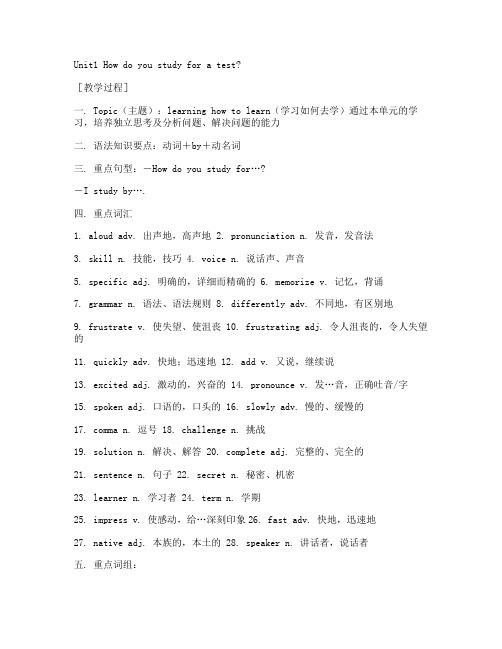
Unit1 How do you study for a test?[教学过程]一. Topic(主题):learning how to learn(学习如何去学)通过本单元的学习,培养独立思考及分析问题、解决问题的能力二. 语法知识要点:动词+by+动名词三. 重点句型:-How do you study for…?-I study by….四. 重点词汇1. aloud adv. 出声地,高声地2. pronunciation n. 发音,发音法3. skill n. 技能,技巧4. voice n. 说话声、声音5. specific adj. 明确的,详细而精确的6. memorize v. 记忆,背诵7. grammar n. 语法、语法规则 8. differently adv. 不同地,有区别地9. frustrate v. 使失望、使沮丧 10. frustrating adj. 令人沮丧的,令人失望的11. quickly adv. 快地;迅速地 12. add v. 又说,继续说13. excited adj. 激动的,兴奋的 14. pronounce v. 发…音,正确吐音/字15. spoken adj. 口语的,口头的 16. slowly adv. 慢的、缓慢的17. comma n. 逗号 18. challenge n. 挑战19. solution n. 解决、解答 20. complete adj. 完整的、完全的21. sentence n. 句子 22. secret n. 秘密、机密23. learner n. 学习者 24. term n. 学期25. impress v. 使感动,给…深刻印象26. fast adv. 快地,迅速地27. native adj. 本族的,本土的 28. speaker n. 讲话者,说话者五. 重点词组:1. 做生字卡 make flashcards2. 向某人求助 ask sb. for help3. 做某事最好的办法the best way to do…4. 例如for example5. 询问ask about6. 根本;一点也不not …at all7. 结束做… end up (doing)sth.8. 用汉语in Chinese 9. 听磁带listen to cassettes10. 口语spoken English 11. 出错make mistakes12. 参加英语俱乐部join an English club13. 练习做…practice doing… 14. 首先first of all15. 开始to begin with 16. 后来later on17. 不敢做…be afraid to do… 18. 在课堂上in class19. 造句make sentences 20. 作笔记take notes21. 决定做…decide to do… 22. 喜欢做…enjoy doing sth.23. 写下;记下write down 24. 组成make up25. 在去…路上on one’s way to 26. 因…而惭愧be ashamed of27. 过时behind the times 28. 关闭turn off29. 嘲笑laugh at 30. 最糟糕的是worst of all31. 适应;适合fit in 32. 如今;现在these days33. 成为…高手become an expert at 34. 放弃give up35. 向某人道别say goodbye to sb. 36. 考虑think about六. 课文解析I. 1a Check (√)the ways you study for an English test. Then add other ways you use sometimes.--by working with friends --by listening to cassettes--by making flashcards --by asking the teacher for help--by reading the textbook --__________________--by making vocabulary lists --__________________1. “by+动名词”常常表示手段、方式或方法,可以用来回答“how”引导的特殊疑问句eg: -How did you finish the job so soon?你是用什么方法这么快就干完了?--By climbing on the roof.我爬到屋顶上做的。
实义动词
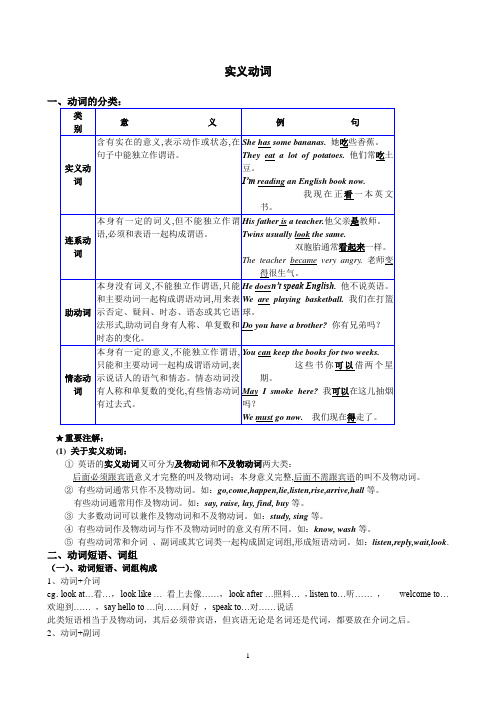
实义动词一、动词的分类:类别意义例句实义动词含有实在的意义,表示动作或状态,在句子中能独立作谓语。
She has some bananas. 她吃些香蕉。
They eat a lot of potatoes. 他们常吃土豆。
I’m reading an English book now.我现在正看一本英文书。
连系动词本身有一定的词义,但不能独立作谓语,必须和表语一起构成谓语。
His father is a teacher.他父亲是教师。
Twins usually look the same.双胞胎通常看起来一样。
The teacher became very angry.老师变得很生气。
助动词本身没有词义,不能独立作谓语,只能和主要动词一起构成谓语动词,用来表示否定、疑问、时态、语态或其它语法形式,助动词自身有人称、单复数和时态的变化。
He does n’t speak English. 他不说英语。
We are playing basketball. 我们在打篮球。
Do you have a brother? 你有兄弟吗?情态动词本身有一定的意义,不能独立作谓语,只能和主要动词一起构成谓语动词,表示说话人的语气和情态。
情态动词没有人称和单复数的变化,有些情态动词有过去式。
You can keep the books for two weeks.这些书你可以借两个星期。
May I smoke here? 我可以在这儿抽烟吗?We must go now. 我们现在得走了。
★重要注解:(1) 关于实义动词:①英语的实义动词又可分为及物动词和不及物动词两大类:后面必须跟宾语意义才完整的叫及物动词;本身意义完整,后面不需跟宾语的叫不及物动词。
②有些动词通常只作不及物动词。
如:go,come,happen,lie,listen,rise,arrive,hall等。
有些动词通常用作及物动词。
如:say, raise, lay, find, buy等。
常见不规则动词变化表
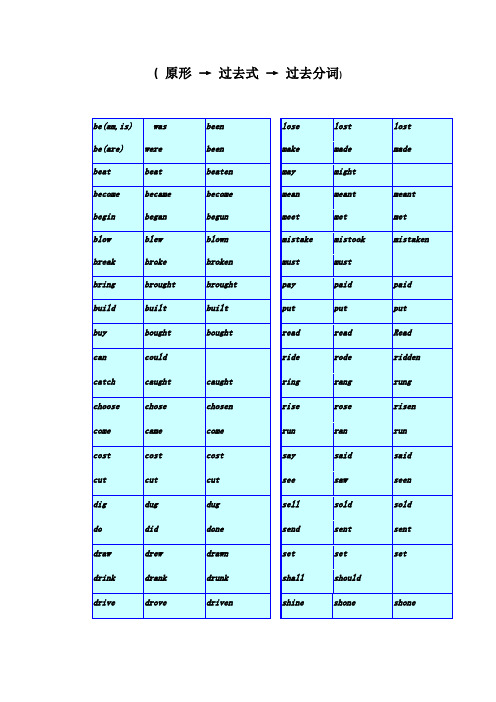
( 原形→过去式→过去分词)常见动词用法辨析(1)“Why not+动词原形+…?”(干嘛不……?)是简略句,完全形式是:Why don’t you+动词原形+…?如:Why not go and have a look?(干嘛不去看看?)/ Why not try it once again?(为什么不再试试?)(2) seem(好象)的用法:记住几个结构:①sb./sth. + seem + (to be+)形容词+…;②sb./sth. + seem + like +…;③sb/sth + seem + to (do);④It seems that+ 从句。
如:He seemed (to be) very happy when he was called by the headmaster.(被校长叫到名字时他好象很开心) / It seems that nobody else could do sucha foolish thing except Jim. (除了吉姆好象没有什么人会做出如此愚蠢的事情来)(3)be afraid(害怕)的用法:记住几个结构:①be afraid of sth; be afraid of (doing);②be afraid to (do); ③be afraid that+从句。
如:She is a little afraid ofsnakes.(她有点怕蛇)/ Don’t be so afraid to stay at home alone at night.(别害怕晚上一个人在家)/ I’m afraid that somebody will take his place because of his serious mistakes.(恐怕有人要取代他了,因为他犯了那么大的错误)(4) be sorry(抱歉)的用法:记住几个结构:①be sorry for (sth); ②be sorry for(doing sth); ③be sorry to (do); ④be sorry that+从句。
study和learn的区别
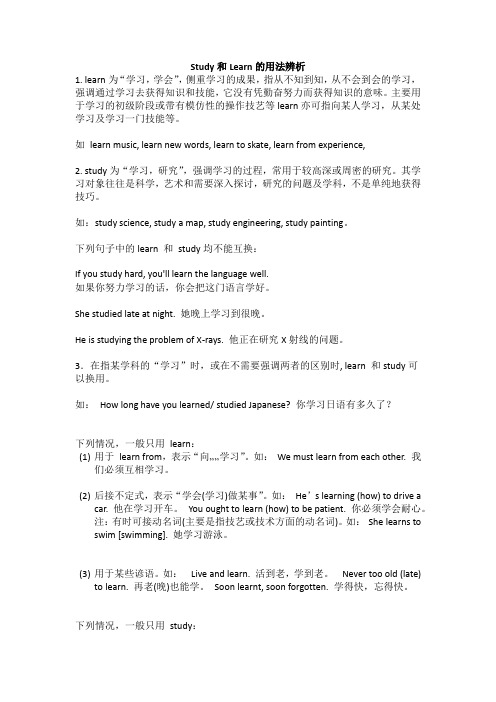
Study和Learn的用法辨析1. learn为“学习,学会”,侧重学习的成果,指从不知到知,从不会到会的学习,强调通过学习去获得知识和技能,它没有凭勤奋努力而获得知识的意味。
主要用于学习的初级阶段或带有模仿性的操作技艺等learn亦可指向某人学习,从某处学习及学习一门技能等。
如learn music, learn new words, learn to skate, learn from experience,2. study为“学习,研究”,强调学习的过程,常用于较高深或周密的研究。
其学习对象往往是科学,艺术和需要深入探讨,研究的问题及学科,不是单纯地获得技巧。
如:study science, study a map, study engineering, study painting。
下列句子中的learn 和study均不能互换:If you study hard, you'll learn the language well.如果你努力学习的话,你会把这门语言学好。
She studied late at night. 她晚上学习到很晚。
He is studying the problem of X-rays. 他正在研究X射线的问题。
3.在指某学科的“学习”时,或在不需要强调两者的区别时, learn 和study可以换用。
如:How long have you learned/ studied Japanese? 你学习日语有多久了?下列情况,一般只用learn:(1)用于learn from,表示“向……学习”。
如:We must learn from each other. 我们必须互相学习。
(2)后接不定式,表示“学会(学习)做某事”。
如:He’s learning (how) to drive acar. 他在学习开车。
You ought to learn (how) to be patient. 你必须学会耐心。
2020年新目标人教版七年级下unit6辅导讲义设计(有答案)
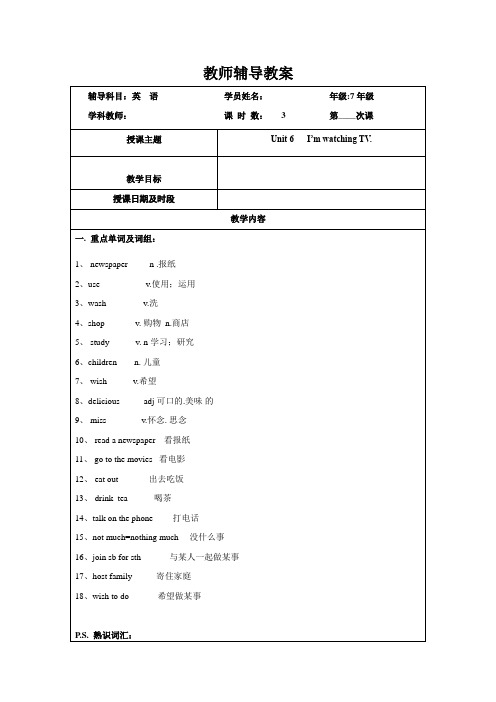
例句
other
“另一个或另一些”是泛指,当形容词或代词用
Some children like apples, other children like bananas.
the other
表示范围内的另一个(范围内一共两个)
I have two pens. One is red and the other is green
learn
侧重于学习的结果,意为“学会”,用于初级阶段的学习。
learn from sb. “向某人学习”
He learns English on the radio.
The baby is learning to speak.
We must learn from each other.
【即学即练】
Just come here a moment.
Just a minute, please.
3) just相关短语
just now刚才
just then就在那时
4. I’d love to.我很乐意。
【解析】本句为省略句,相当于I’d love to eat out.
I’d love to=I’d like to,其中I’d =I would.
A. other B. another C. others D. the other
3) The supermarket is on _____ side of the street.
A. other B. another C. the other D. others
4) There are three books on my table. One is here. Where are ___?
我们学英语的英文
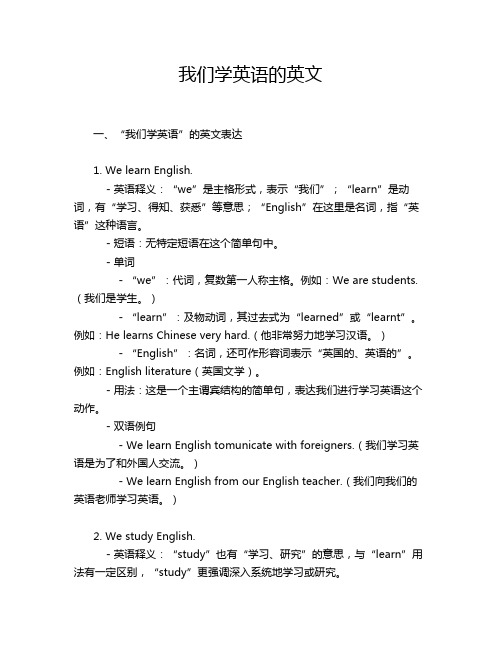
我们学英语的英文一、“我们学英语”的英文表达1. We learn English.- 英语释义:“we”是主格形式,表示“我们”;“learn”是动词,有“学习、得知、获悉”等意思;“English”在这里是名词,指“英语”这种语言。
- 短语:无特定短语在这个简单句中。
- 单词- “we”:代词,复数第一人称主格。
例如:We are students.(我们是学生。
)- “learn”:及物动词,其过去式为“learned”或“learnt”。
例如:He learns Chinese very hard.(他非常努力地学习汉语。
) - “English”:名词,还可作形容词表示“英国的、英语的”。
例如:English literature(英国文学)。
- 用法:这是一个主谓宾结构的简单句,表达我们进行学习英语这个动作。
- 双语例句- We learn English tomunicate with foreigners.(我们学习英语是为了和外国人交流。
)- We learn English from our English teacher.(我们向我们的英语老师学习英语。
)2. We study English.- 英语释义:“study”也有“学习、研究”的意思,与“learn”用法有一定区别,“study”更强调深入系统地学习或研究。
- 短语:无特定短语在此句。
- 单词- “study”:可作动词和名词。
作动词时,过去式为“studied”。
例如:They study hard every day.(他们每天努力学习。
)作名词时,例如:My study is on the second floor.(我的书房在二楼。
)- 用法:主谓宾结构,与“We learn English”类似,但语义上略有不同。
- 双语例句- We study English grammar carefully.(我们认真学习英语语法。
- 1、下载文档前请自行甄别文档内容的完整性,平台不提供额外的编辑、内容补充、找答案等附加服务。
- 2、"仅部分预览"的文档,不可在线预览部分如存在完整性等问题,可反馈申请退款(可完整预览的文档不适用该条件!)。
- 3、如文档侵犯您的权益,请联系客服反馈,我们会尽快为您处理(人工客服工作时间:9:00-18:30)。
下列情况,一般只用 study: (1) 表示在某校g University. 他在北京大学学习 (2) 用于祈使句或与 hard 连用。如: Study hard and make progress every day. 好好学习,天 天向上。 用于某些习语。如: • Study late into the night 学习到深夜 • Study into the early morning hour 学习到凌晨
4. 其他用法区别 除表示“学习”外,learn 还表示“听说”“得知”等义;study 还 表示“打量”“仔细看”等义。此时两者显然不能互换。如: I’m sorry to learn of [about] your illness. 听说你病了,我很 难过。 They studied the stranger curiously. 他们好奇地看着这位 陌生人。
Study和 Learn的用法辨析
• study English • learn English
把英语作为一门“技术”来学习(learn),而 不要将其作为一门“学问”来研究(study) I had to learn a trade at the age of seven. This question should be carefully studied.
另外,learn虽然也可指学习的过程, 但更侧重指学到的成果,因此常译为 “学到”“学会”;而study则侧重 指学习过程。如: He studied hard and learned English very well. 他努力学习,把英语学得很好。
下列情况,一般只用 learn: (1) 用于 learn from,表示“向……学习”。如: We must learn from each other. 我们必须互相学习。 (2) 后接不定式,表示“学会(学习)做某事”。如: He’s learning (how) to drive a car. 他在学习开车。 You ought to learn (how) to be patient. 你必须学会耐心。 注:有时可接动名词(主要是指技艺或技术方面的动名词)。如 : She learns to swim [swimming]. 她学习游泳。 (3) 用于某些谚语。如: Live and learn. 活到老,学到老。 Never too old (late) to learn. 再老(晚)也能学。 Soon learnt, soon forgotten. 学得快,忘得快。
